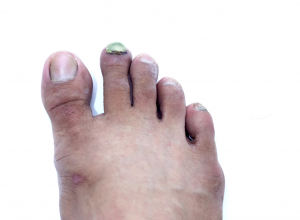
Psoriasis
Psoriasis is a chronic disease characterized by patches of abnormal skin that are often red, itchy and scaly. It can appear anywhere on the body, including on the feet and toenails. It is thought to be a genetic disease that can be triggered by environmental factors and psychological stress. It is not contagious.
Symptoms
The most noticeable symptom of psoriasis is patches of rough, scaly skin that are either white, silvery or red in color. These patches vary in size from small to very large, and they can appear anywhere on the body — though most commonly, the patches are found on the knees, elbows, lower back, scalp, hands and feet. In severe cases of psoriasis, the skin becomes itchy and tender. Psoriasis can also affect the fingernails and toenails, leaving them susceptible to pitting, discoloration and separating from the nail bed (called onycholysis).
The patches form when new skin cells grow rapidly and push themselves to the surface. Normal skin cells grow and flake off about every four weeks, whereas skin cells afflicted with psoriasis grow within a matter of days. The resulting thick patches are called plaques.
Some people experience swollen, tender, painful joints when they have psoriasis. When this happens, the disease is called psoriatic arthritis. About one third of patients with psoriasis experience these symptoms. It is a very destructive form of psoriasis and must be treated with medication quickly to halt the disease’s progression.
Sometimes the symptoms go away on their own, and other times the symptoms get worse. Certain environmental factors can cause flare-ups of psoriasis, including a cold and dry climate. Other things like colds, infections and stress can cause flare-ups, as well. It is not unusual for symptoms to clear up and for the disease to go into remission for several months or even years at a time.
Causes
Experts disagree on what exactly causes psoriasis, but a popular opinion is that it is a response to a weakened immune system or an immune system that overreacts. In some cases, psoriasis is genetic, meaning it runs in families.
Obesity, heart disease and diabetes seem to be more common in people with psoriasis.
Psoriasis is not contagious, even if you directly touch someone with the disease.
Types
There are several types of psoriasis. They are psoriasis vulgaris (the most common type), guttate psoriasis (which creates small spots of patchy skin), inverse psoriasis (which generally appears in folds of skin such as in the navel, underarms, ears and buttocks), pustular psoriasis (which creates pustular yellow blisters), erythrodermic psoriasis (which affects the entire body), and palmoplantar psoriasis (which affects the palms of the hands and soles of the feet).
Treatment
Unfortunately, psoriasis is an incurable skin disease. The good news is that most cases of psoriasis are mild and only require regular application of creams, lotions and aloe vera. Sometimes your doctor may recommend special shampoos, medications, steroid injections and ultraviolet light (phototherapy or PUVA therapy) to further soothe the skin. These treatments typically must last a lifetime.
One way to reduce the effects of psoriasis is to avoid conditions that cause flare-ups. This includes avoiding skin injuries, infections, stress and anxiety, long exposure to sunlight, alcohol and smoking. Eating a healthy diet is also a way to keep psoriasis under control.
Not all dermatologists treat psoriasis, so you will want to seek a health care professional who specializes in the disease. The American Academy of Dermatology and the National Psoriasis Foundation (NPF) are two sources that may also help you find qualifying physicians.
Notice concerning medical entries:
Articles having medical content shall serve exclusively for the purpose of general information. Such articles are not suitable for any (self-) diagnosis and treatment of individual illnesses and medical indications. In particular, they cannot substitute for the examination, advice, or treatment by a licensed physician or pharmacist. No replies to any individual questions shall be effected through the articles.








